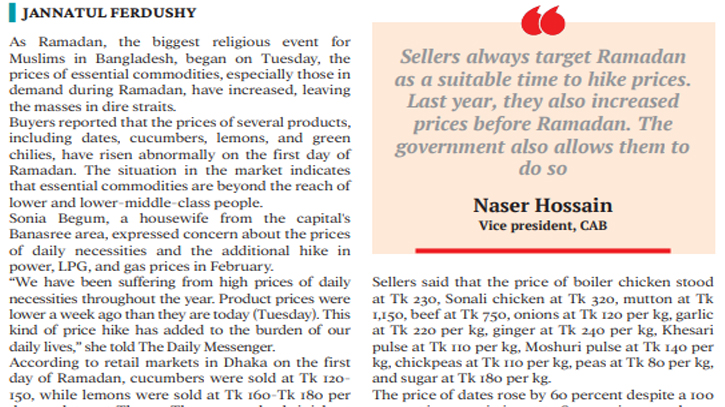
Photo : Messenger
As Ramadan, the biggest religious event for Muslims in Bangladesh, began on Tuesday, the prices of essential commodities, especially those in demand during Ramadan, have increased, leaving the masses in dire straits.
Buyers reported that the prices of several products, including dates, cucumbers, lemons, and green chilies, have risen abnormally on the first day of Ramadan. The situation in the market indicates that essential commodities are beyond the reach of lower and lower-middle-class people.
Sonia Begum, a housewife from the capital's Banasree area, expressed concern about the prices of daily necessities and the additional hike in power, LPG, and gas prices in February.
“We have been suffering from high prices of daily necessities throughout the year. Product prices were lower a week ago than they are today (Tuesday). This kind of price hike has added to the burden of our daily lives,” she told The Daily Messenger.
According to retail markets in Dhaka on the first day of Ramadan, cucumbers were sold at Tk 120-150, while lemons were sold at Tk 160-Tk 180 per dozen, dates at Tk 450-Tk 1000 per kg, brinjals at Tk 60 to Tk 80, and green chilies at Tk 110-Tk 120.
Sellers said that the price of boiler chicken stood at Tk 230, Sonali chicken at Tk 320, mutton at Tk 1,150, beef at Tk 750, onions at Tk 120 per kg, garlic at Tk 220 per kg, ginger at Tk 240 per kg, Khesari pulse at Tk 110 per kg, Moshuri pulse at Tk 140 per kg, chickpeas at Tk 110 per kg, peas at Tk 80 per kg, and sugar at Tk 180 per kg.
The price of dates rose by 60 percent despite a 100 percent increase in imports. Sugar prices rose by 24 percent, while imports rose by 47 percent.
Sohel Rana, a grocery shopkeeper, said, “We buy at high prices, so we have to sell at high prices. We have nothing to do to control the prices. Sometimes, prices hike every week.”
Naser Hossain, the vice president of the Consumer Association of Bangladesh (CAB), said, “Sellers always target Ramadan as a suitable time to hike prices. Last year, they also increased prices before Ramadan. The government also allows them to do so.”
Aminul Islam, a consumer at Shah Ali Market in the Mirpur area, said that watermelons are now Tk 80 per kg, which is beyond the reach of lower-class people.
However, experts believe that offering consumer goods to low-income families at subsidised prices will help in the short term, but they blame policymakers for not being able to control the market.
Moreover, due to inflationary pressure, people from the middle class and lower incomes have reduced their protein intake from meals by 49 percent, according to the Global Food Security Index (GFSI).
Additionally, the prices of different types of vegetables have risen by 100 to 150 percent. Egg prices have increased from Tk 145 to Tk 148 per dozen. Chicken prices have risen by about 100 percent over the year.
To ease the pressure on consumers, the government has exempted duty by 50 percent on sugar imports, though traders have increased imports by 39.7 percent year-on-year amid Eid.
Messenger/Fameema








